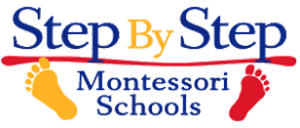Kindergarten Program
Did you know that most public kindergarten programs are based on half day curriculum? That means even if your child is participating in a full day kindergarten program the curriclum only provides for a half day of academics. The rest of day is filled with non-academic time like dramatic play, outside time or other play time. Don’t waste a year of academics for your child while everyone else catches up.
The kindergarten program at Step By Step Montessori is an extension of the traditional Montessori classroom. It is an opportunity for children to learn new skills at their own rates of development and therefore advance accordingly. Emphasis is placed of language arts, reading, social skills, math, science, and individual activities to promote group and individual skills. The children work a full day on academics and routinely read at advanced levels and are working on advanced math concepts.
If your child has a birthday after the cutoff date for entry into an elementary school program and you choose to participate in our kindergarten program. Step By Step Montessori will not guarantee your child will be granted early enrollment into a grade level ahead of their scheduled start year. Specifically if your child turns 5 after Sept 1st we do not guarantee that the elementary school (public or private) will accept the child next year for 1st grade. Children must be five years old by September 1st to be admitted into our kindergarten program.
“Most children at age five are at a very different development stage from children at age six. The Montessori primary (age 3 to 6) program is elegantly designed to play to the reality of their stage of development.” – Tim Seldin, Chair of the International Montessori Foundation
We offer our kindergarten program at all 7 Step By Step Locations: Chaska, Corcoran, Edina (Southdale), Maple Grove, Plymouth, St. Anthony, and Wayzata. Call us today or fill out this form to schedule your tour!
Why Montessori for the Kindergarten Year?
Questions Most Frequently Asked About Montessori Kindergarten
Q: Why spend precious family resources on one more year of Montessori when we can enroll our child in a local kindergarten program for free?
It’s a question that many Montessori parents of four year olds ask themselves at this time of year. It’s a fair question, and it deserves careful consideration. Every family’s circumstances are different, and it all comes down to a question of priorities, not necessarily financial. Every Montessori administrator can cite examples of how families of modest means go to extra-ordinary lengths to keep their children in Montessori. Here are a few answers to some of the questions parents often ask about Montessori for their kindergarten child.
Q: What is the most important short-term disadvantage of sending my five year old to the local schools?
When a Montessori child transfers into such a program, there is a period of adjustment, and most kindergartens have very different expectations for five year olds than Montessori programs. The kindergarten year in Montessori is a critical component of the three-year cycle. It is a year when their earlier experiences are internalized and reinforced. When children leave Montessori before kindergarten, many of their earlier learning experiences may be lost because they are not reinforced or completed understood.
Q: What is the most important advantage of keeping my five year old in Montessori?
Montessori at every level excels at teaching children to “learn how to learn.” It is a system that is focused on teaching for understanding, using concrete materials to prepare children for future abstract academic skills. It is these sensorial impressions that become the foundation for a lifetime of understanding.
Q: How will the multi-age grouping of a Montessori classroom affect my kindergarten child’s ability to do her work?
It is true that five year olds in Montessori classes often help younger children with their work, actually teaching lessons or correcting errors. Research shows that when children teach or coach one another, both children benefit. Usually the “teacher” learns as much, and sometimes more, then the person being taught.
Q: Since my child will eventually end up in a neighborhood school, isn’t it better to make the transition in kindergarten?
By the end of the kindergarten year, Montessori students will often have developed academic skills that may be beyond those of children enrolled in most American kindergarten programs; however, parents should remember that academic progress is not our ultimate goal.
Our real hope is that children will have an incredible sense of self-confidence, enthusiasm for learning, and feelings of being closely bonded to their teaches and classmates. We want them to enjoy school and feel good about themselves as students.
Once these children have developed these internal skills, they normally can adapt to all sorts of new situations. When the time comes for them to go off to their new school, they will take with them not only a vibrant curiosity but also an excitement about making new friends and learning new things. The kindergarten year is an important element to this process.
The above article contains excerpts from Tomorrow’s Child Winter 2000/01 issue, Volume 9, Number 2

